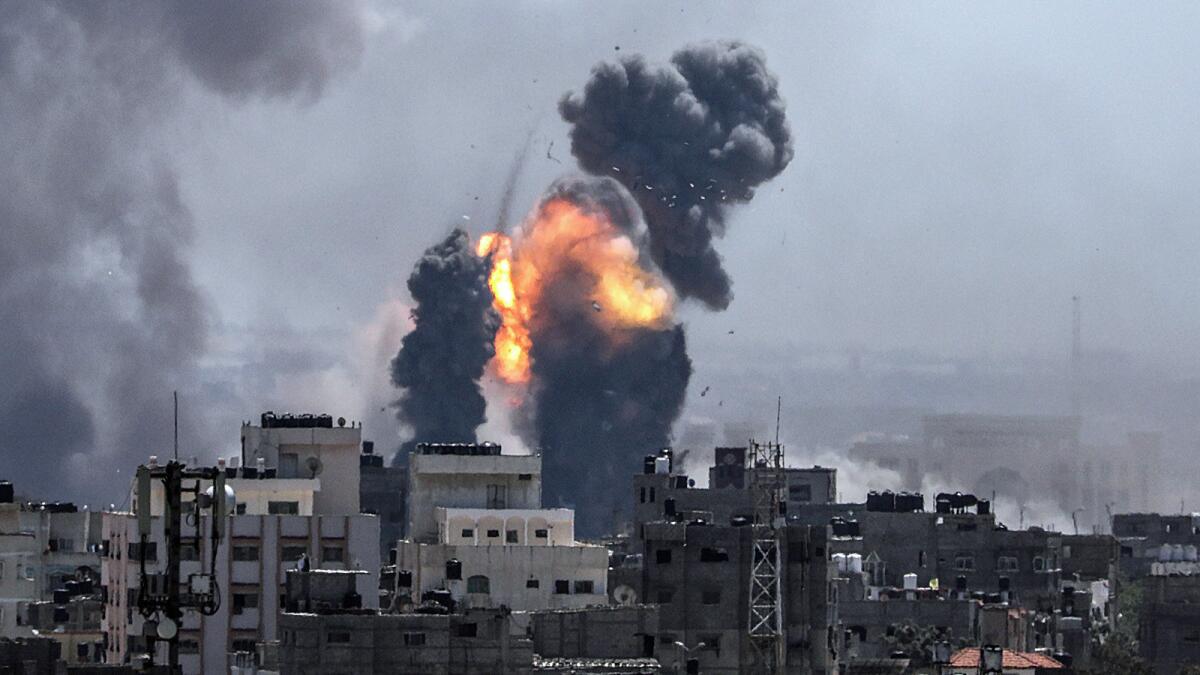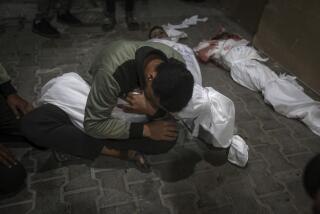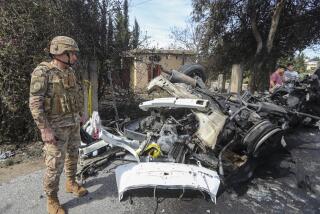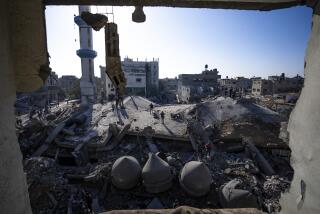Israel strikes Gaza after Palestinian militants unleash a barrage of rockets

Palestinian militias launched more than 250 rockets into southern Israel from Gaza on Saturday, in the latest escalation of violence in the long-simmering conflict.
An Israeli man in Ashkelon died in the bombardment when his apartment suffered a direct hit. Meanwhile, the Gaza Ministry of Health reported that five Palestinians had been killed in the Israeli airstrikes on Saturday, including a pregnant woman and a toddler. The circumstances under which they died remained unclear.
The Israeli army said its retaliatory airstrikes and tank fire struck more than 120 targets belonging to Hamas, the Islamist paramilitary group that controls Gaza, and the Palestinian Islamic Jihad, or PIJ, a rival group that joined Hamas in the cross-border attacks.
The army also said it destroyed a PIJ tunnel connecting southern Gaza and Israel that was intended to be used to carry out “a terror attack inside Israel.”
Air raid sirens blared in the city of Beer Sheva, a major Israeli metropolitan hub in northern Negev. The spread of violence to the city represented a significant escalation in the conflict.
The latest round of violence began with gunfire during Friday’s Gaza border protests, in which two Israeli troops were wounded by a PIJ sniper, the Israeli army said.
According to the army, several dozen rockets were intercepted by the Iron Dome missile defense system.
Israel killed two Hamas operatives in airstrikes Friday, and two Palestinian protesters died in the border clashes.
An army spokesman, Lt. Col. Jonathan Conricus, said that “five or six Hamas and PIJ terrorists” were killed by Israeli strikes on Saturday.
The renewed fighting threw the south of the country onto war footing, sending Saturday beachgoers into shelters and marring weekend plans for some 2 million people. School was canceled across all of southern Israel Sunday.
Conricus condemned the “reckless and coordinated rocket fire effort.”
In Gaza, Hamas spokesman Abdul Latif Qanou said the militant group “will continue to respond to the crimes of the occupation,” and will not allow Israel “to shed the blood of our people.” He said Hamas was committed to defending and protecting the Palestinians in Gaza.
The escalation between Israel and armed factions in Gaza comes at a delicate moment — less than a week ahead of Israel’s memorial and independence days, and as Prime Minister Benjamin Netanyahu, who retained his post after a close race last month, tries to form a coalition for his next government.
In addition, Israel has been gearing up for the Eurovision Song Contest, a marquee event that will be broadcast around the world.
Former army chief Benny Gantz, Netanyahu’s principal rival in the elections, blasted the prime minister.
“When a lack of policy and consistency meets acquiescence to Hamas’ blackmail over the past year, we are met on a Saturday morning by heavy barrages on Israel and another round of extortion [by Palestinian terror groups],” he said, at a public event.
U.S. State Department spokesperson Morgan Ortagus on Saturday called on Hamas and PIJ to end the attacks.
“The United States strongly condemns the ongoing barrage of rocket attacks by Hamas and Palestinian Islamic Jihad from Gaza upon innocent civilians and their communities across Israel,” Ortagus said. “We call on those responsible for the violence to cease this aggression immediately. We stand with Israel and fully support its right to self-defense against these abhorrent attacks.”
Before the latest intensification of clashes with Gaza, the city of Tel Aviv had heightened security preparations in anticipation of thousands of incoming Eurovision fans.
According to Israeli analysts, Hamas may hope that the pressure of the upcoming public events will improve the chances that the escalation will lead to a compromise and greater concessions for the Palestinian factions.
While the fighting was underway, Hamas leader Yahya Sinwar and PIJ leader Ziad Nahala were in Cairo, where Egyptian intelligence officials have spent months attempting to negotiate a long-term cease-fire with Israel.
Criticizing Israel’s tacit participation in the negotiations, Gantz said “the Israeli government must reassert deterrence and only then seek a long-term agreement, without security compromises and without extortion.”
More than a year after the regular Friday border protests began, with close to 200 Palestinians killed and with few tangible benefits, Hamas is eager to show Palestinians it made some strides against Israel ahead of Sunday night, the start of the Muslim holy month of Ramadan, traditionally a time of family gatherings, festivities and spending.
Instead, the Israeli army announced the return to a stricter blockade of Gaza, which has been isolated by Egypt and Israel since 2007, when Hamas, which Western countries have listed as a terrorist organization, took power.
In a joint statement, Hamas and PIJ warned Israel that its response would be “stronger and more widespread” if Israel continued its strikes on Gaza.
Special correspondent Abu Alouf reported from Gaza City and special correspondent Tarnopolsky from Jerusalem.
More to Read
Start your day right
Sign up for Essential California for news, features and recommendations from the L.A. Times and beyond in your inbox six days a week.
You may occasionally receive promotional content from the Los Angeles Times.






